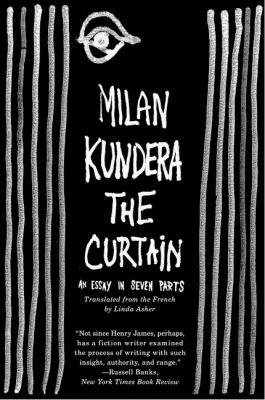
The Curtain : an essay in seven parts
Available Copies by Location
| Location | |
|---|---|
| Community Centre | Checked out |
Browse Related Items
| Subject |
| Literature > Philosophy Fiction > History and criticism |
- ISBN: 9780060841959 (pbk.)
- ISBN: 0060841958 (pbk.)
-
Physical Description
print
viii, 168 p. ; 21 cm - Publisher New York : Harper Perennial, 2008
Content descriptions
| General Note: | Originally published in France as "Le Rideau : essai en sept parties" by Editions Gallimard |
| Formatted Contents Note: | Part One: The consciousness of continuity. -- Part Two: Die Weltliterartur. -- Part Three: Getting into the soul of things. -- Part Four: What is a novelist? -- Part Five: Aesthetics and existence. -- Part Six: The torn curtain. -- Part Seven: The Novel, memory, forgetting |
Additional Information

The Curtain : An Essay in Seven Parts
Click an element below to view details:
Summary
The Curtain : An Essay in Seven Parts
"An elegant, personalized integration of anecdote, analysis, scholarship, memory and speculation. . . . Not since Henry James, perhaps, has a fiction writer examined the process of writing with such insight, authority and range of reference and allusion." --Russell Banks, New York Times Book Review "A magic curtain, woven of legends, hung before the world. Cervantes sent Don Quixote journeying and tore through the curtain. The world opened before the knight-errant in all the comical nakedness of its prose." In this thought-provoking, endlessly enlightening, and entertaining essay on the art of the novel, renowned author Milan Kundera suggests that "the curtain" represents a ready-made perception of the world that each of us has--a pre-interpreted world. The job of the novelist, he argues, is to rip through the curtain and reveal what it hides. Here an incomparable literary artist cleverly sketches out his personal view of the history and value of the novel in Western civilization. In doing so, he celebrates a prose form that possesses the unique ability to transcend national and language boundaries in order to reveal some previously unknown aspect of human existence.


